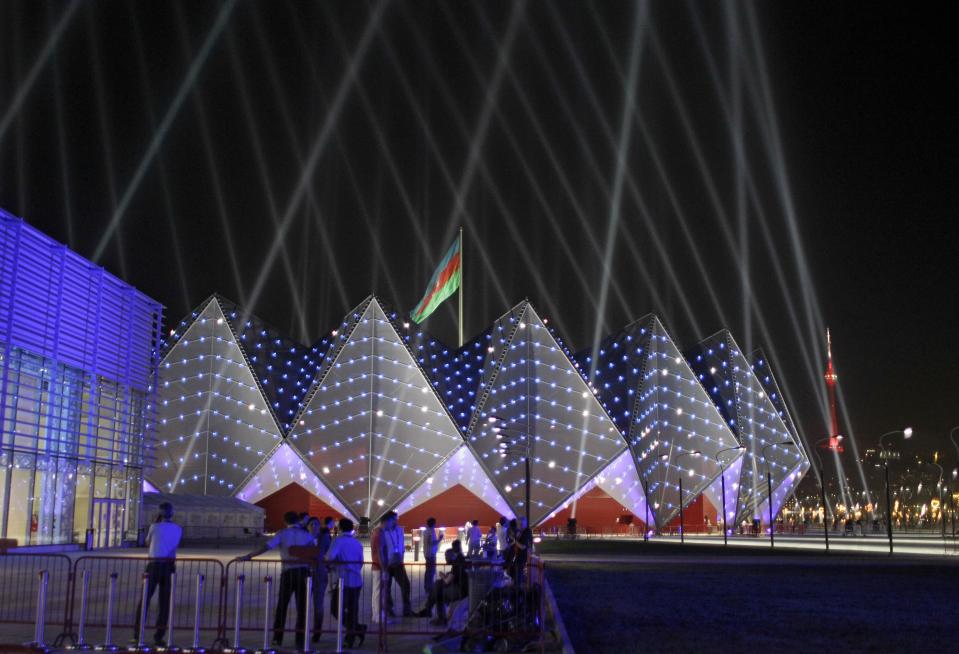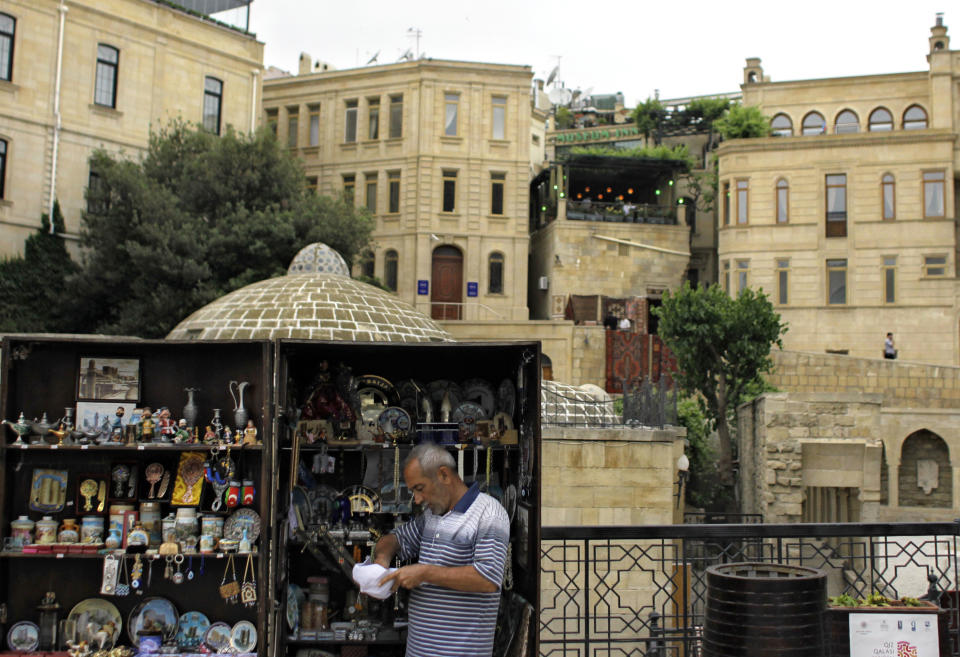Azerbaijan basks in glitz, fears exposure
BAKU, Azerbaijan (AP) — On a recent evening on Baku's seaside promenade, throbbing Euro-dance music blared out from an open-air concert as families strolled by. Cafes serving fragrant skewered meat served throngs of locals and foreigners.
The capital of this former Soviet republic has shed its dour, industrial image and evolved into a vibrant metropolis combining the old world charms of Istanbul with the architectural ostentations of Dubai. Now it has the perfect stage to show off its decade-long transformation: the Eurovision Song contest.
The extravaganza is viewed by some 125 million people worldwide. Now in its 57th year, it's an epic battle of plastic pop pitting performers from 42 nations against one another. Musically, it's a global laughingstock (that's part of the charm) — but for host countries, the event can serve as a valuable PR platform. To authorities, the contest also risks exposing what critics say is rampant repression and cronyism.
The finals — in which British crooner Engelbert Humperdinck is touted as a hot favorite — are held Saturday in the new $134 million Crystal Palace concert hall on a point jutting out into the Caspian Sea.
As darkness falls, Baku's entire skyline turns into a glaring, electric testament to profligacy and confidence. The city's renovated Art Nouveau and Islamic-era architecture increasingly competes for attention with constructions like the wavy, glass-fronted Flame Towers complex, whose three skyscrapers light up at night in a playful LED display.
The upscale restaurants and exclusive designer boutiques hint at a burgeoning moneyed elite riding high on the riches generated by the two decade-long oil boom.
While the country grows ever richer, many in Azerbaijan, a nation of some 9 million Turkic language-speaking people, are once more embracing their Islamic heritage, which was suppressed during Soviet times. Headscarves are an increasingly common sight, and a ban on their use in schools announced in 2010 drew sharp public protests.
As Islam flourishes, however, rights activists also say that blatant trampling of democratic freedoms is being ignored by Western powers eager to exploit Azerbaijani oil wealth. Advocacy groups are using the global attention generated by Eurovision to publicize rights issues they say have been overlooked for years.
"Both local rights activists and international human rights groups view this as an opportunity to highlight to the world just what is going on in Azerbaijan, which doesn't normally receive a lot of press coverage," said Max Tucker, Azerbaijan campaigner for Amnesty International.
For the West, Azerbaijan has long been mainly about oil.
The nation has been drawing in foreign prospectors, including many Americans, since as far back as the final decades of the 19th century. The country is a geographic minnow compared with neighbors Iran, Russia and Turkey, but its location and natural resources give it an outsized role in history.
Within six decades of the construction of the first modern wells in the 1840s and subsequent investment by foreign tycoons like the Nobels and the Rothschilds, Baku accounted for more than half of oil production worldwide.
That early energy boom withered during the Soviet interlude, but resumed again in the post-independence 1990s.
While there is disagreement on exactly how much oil the country has, the general consensus is that proven reserves lie somewhere north of 7 billion barrels.
On top of that, Azerbaijan is also estimated to sit above around 850 billion cubic meters (30 trillion cubic feet) of natural gas.
BP has loomed largest among the international energy majors. The company has a 34 percent stake in the Azeri-Chirag-Gunashli oil field off the Caspian Sea shore. The reserve is so massive, geologists initially believed it to consist of three separate fields.
Other big players that have partnered up with national oil company SOCAR include U.S. majors Chevron and ExxonMobil, Norway's Statoil, and Turkiye Petrolleri.
Azerbaijan's calibrated ambivalence toward U.S. geopolitical antagonists Russia and Iran have made it a particularly appealing source of energy to the West.
Tensions with Iran have deepened in recent months over Azerbaijani suspicions that Tehran supports radical religious extremists in its midst.
Relations with Russia are cordial but undermined by what Baku perceives as Moscow's support for neighboring Armenia, with which Azerbaijan fought and lost a bitter six-year conflict over the disputed Nagorno-Karabakh territory from 1988.
The West's cozy relations with Azerbaijan have drawn vehement criticism from rights activists, who maintain that economic interests have trumped concerns over democracy.
The U.S. State Department's own 2010 human rights reports speaks of limitations on freedom of expression and assembly, impediments to political activities and a flawed election that secured a new term for President Ilham Aliyev in 2008. After changes to the law in 2009, Aliyev, who inherited power from his late father in 2003 in a move that many have described as a monarchic-style handover, will be permitted to run for office indefinitely.
Journalists who have bucked the trend by reporting on alleged corruption in government have often faced repercussions.
In a prominent recent case, investigative reporter Khadija Ismayilova received an envelope stuffed with intimate photographs that she was made to understand would be made public if she didn't stop her aggressive reporting. Instead of backing down, Ismayilova went public with the blackmail threat. Covertly filmed footage of her at home was posted online days later.
Undeterred, Ismayilova has since reported for Radio Free Europe about how Aliyev's family has allegedly profited from the construction of the newly built concert hall in which the Eurovision contest is to be held.
Several small Arab Spring-inspired political rallies have been broken up violently by police over the last year. People linked with the meetings have ended up behind bars for lengthy sentences on unrelated charges or been enrolled into military service, despite being exempt. Similar attempts to hold anti-government rallies ahead of the Eurovision finals have also been robustly shut down.
As is typical in other energy-rich authoritarian post-Soviet states, Azerbaijan's government has sought to mitigate criticism of its poor democratic record by pointing to economic achievements.
Rapid economic growth has created a class of new super-rich. But it has also cut the number of people mired in poverty fivefold over the past eight years to around 7.6 percent of the population, according to government figures released in January.
Those figures are roughly in line with World Bank data.
Still, beyond the fringes of Baku, life is notably harder. Average monthly salaries stand around $450, which explains why the giant SUVs that jam the city's smooth, broad streets are not often seen elsewhere.
Economic experts warn that as the end of the peak of the frenzied oil boom beckons, Azerbaijan will need to adopt a less state-dominated model. But many worry that market proponents are being thwarted by political hardliners.
International coverage of democracy concerns has been met with unvarnished scorn by Azerbaijani authorities, who say Azerbaijan is the victim of a smear campaign by international rights groups.
"We are a democratic country," presidential spokesman Ali Hasanov said this week. "We are located at the crossroads of Asia and Europe. We could remain in Asia, but we have chosen the way of European development."


